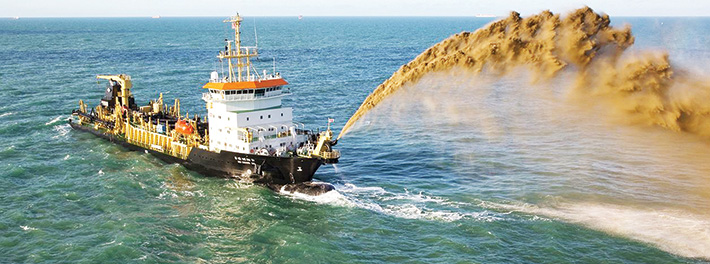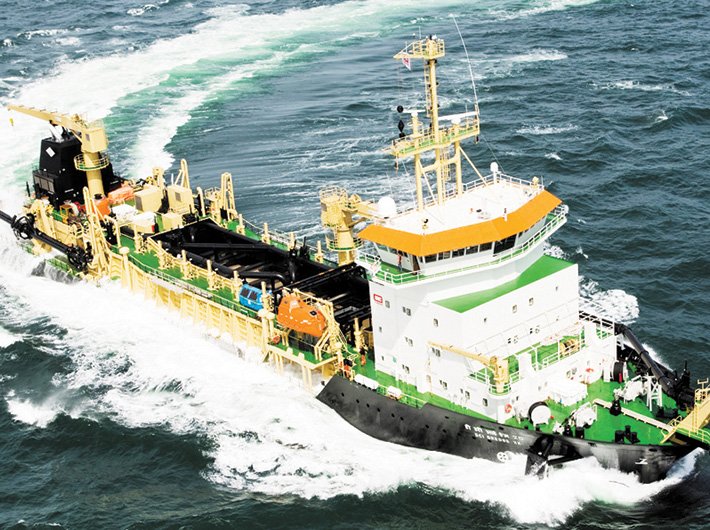India’s only state-run dredging company is going to be privatised, leaving employees worried. One employee has even taken his life
N Venkatesh, a cheerful human resource employee of the Dredging Corporation of India (DCI), a miniratna PSU, killed himself early this month: his body was found lying next to a train track in Visakhapatnam.
Venkatesh’s brother-in-law Maheedhar told Governance Now that Venkatesh, 29, committed suicide as he was distressed about DCI’s proposed privatisation.
“When I spoke to him a week ago before his suicide, he raised concerns about privatisation. I had assured him that he would be getting at least three months to find a new job and I would help him to do so,” said Maheedhar over telephone.
“DCI’s proposed privatisation claimed his life,” he rued.
Maheedhar, cited Venkatesh’s suicide note, which blamed the centre for its decision to withdraw its 73.47 percent of shareholding in DCI that would render thousands of its employees, including him, jobless.
The suicide of a promising young man who was shouldering the responsibility of his parents, which included his father who works at a mill where he earns just Rs 4,000 a month, has brought into sharp focus India’s only state-run dredging company which is up for sale.
DCI’s proposed strategic sale is part of the government’s plan of raising Rs 72,500 crore through disinvestment of PSUs in 2017-18. Of that, Rs 15,000 crore has to come from strategic divestment. The government is hopeful of raising around Rs 1,400-1,500 crore through privatisation of DCI.
What is troubling the employees like Venkatesh is that DCI is not a loss-making public sector undertaking (PSU) yet is now part of the government’s privatisation package. It may not be delivering handsome profits, but it continues to do reasonably well since its inception in 1976.
The tension among the employees is palpable as they fear losing their jobs.
“Selling a company like DCI will compromise national security as we also deal with naval ports. Even now, ports fall back on DCI in times of crisis and when private contractors fail to complete the job. Privatisation will put national assets in grave danger,” said an office bearer of DCI Officers’ Association (DCIOA) and added that the corporation has never registered any loss since its inception.
Apart from job security, DCI employees are also worried about the fact that if a private company acquires the corporation, national security may get compromised as DCI holds strategic importance and naval establishments rely on it for dredging.
DCI is the only public sector enterprise in India which is in the business of dredging since its inception in 1976. Dredging helps keep waterways navigable and creates an anti-sludge pathway for ships.
The corporation is involved in maintenance dredging, capital dredging, which entails creating new shipping channel for large ships, replenishing sand on beaches, land reclamation, shallow water dredging, project management consultancy and marine construction. DCI provides dredging services to all major ports and the Indian navy. DCI is among the 10 best dredging companies in the world.
The department of investment and public asset management (DIPAM) constituted an inter-ministerial group (IMG) on November 16, 2017 for ‘strategic divestment of government of India’s equity in DCI through strategic sale’.
The centre has disinvested stakes of DCI in four installments. In 1991-92, the government divested 1.44 percent of its share, 20 percent in 2003-04, five percent in 2015-16 and 0.09 percent in 2016-17. The present holding of the government is 73.47 percent in DCI. The paid-up capital of DCI is only Rs 28 crore and it has 50,000 shareholders, said the officer’s association.
The association said that the government’s present proposal is for outright sale, which is causing agony among the employees who have toiled for the past 40 years to ensure growth of DCI.

“As many as 2,000 direct and indirect employees may lose their jobs. The private company, which will take over, may not retain all of them. Dredging is a specialised service and not everybody can do it. Employees are totally against the strategic sale of DCI,” president, DCI Officers’ Association, BH Nayak said.
Nayak said that DCI had done dredging in the Sethusamudram project and invested Rs 578 crore, but the dues are yet to be paid by the government. The high-level committee appointed by the shipping ministry has recommended an amount of around Rs 300 crore to be paid to DCI, but it is yet to come.
DCI posted one of its lowest total comprehensive incomes of Rs 7.12 crore in 2016-17 against Rs 43.50 crore in 2015-16.
In the ongoing disinvestment, the government has garnered total divestment proceeds of Rs 52,389.86 crore till December 4, 2017. Through divestment of strategic holdings and income from management of Specified Undertaking of Unit Trust of India (SUUTI) investment, receipts of Rs 4,153.65 crore have been raised till December, as per the DIPAM website.
The government has been proactively undertaking strategic sale of stakes in profitable PSUs to raise its revenue receipts to bridge the fiscal deficit but it has always struggled to meet its divestment targets in the past.
According to a web portal BSE PSU, which analyses divestment activities, the disinvestment has slowed down from 2011 considerably. As against a target of Rs 40,000 crore for 2011-12, the government had raised only Rs 14,000 crore. From 2012, the condition improved a little with the government garnering Rs 23,857 crore against a target of Rs 30,000 crore (Revised Target: Rs 24,000 crore) in 2012-13 and Rs 21,321 crore against a target of Rs 54,000 (Revised Target: Rs 19,027 crore) in 2013-14.
The achieved target dropped to Rs 24,338 crore against a target of Rs 58,425 crore in 2014-15 and Rs 18,409 crore against a target of Rs 69,500 (Revised Target: Rs 30,000 crore) in 2015-16.
DIPAM secretary Neeraj Kumar Gupta did not reply to Governance Now’s repeated queries on the government’s bid to meet its divestment target and the future of DCI.
Among the reasons behind DCI’s depleting revenue is outstanding dues from Kolkata port, Kandla port, Goa port and Cochin port. The dues have been mounting over the years, said the DCI association.
DCI had procured three new modern dredgers in between 2012 and 2014 by spending Rs 1,500 crore, involving a foreign loan of over Rs 1,000 crore. The dredgers have been mainly procured to cater to the dredging needs of Haldia port in Kolkata, which is being serviced by the DCI for the past 30 years. However, Haldia port last year chose tender over nomination process which was again bagged by DCI.
The recent dredging work at Goa, which DCI had secured on global tender basis, has been stopped after National Green Tribunal’s directions. Because of this, four dredgers are lying idle at Goa port and the DCI is struggling to find another assignment.
Striving to meet divestment target
The government has already raised revenue of Rs.52,389.86 crore till December 4 and three more months are left before 2017-18 FY ends. The divestment target is Rs.72,500 crore in the current fiscal.
Experts say that if the government manages to sell its 51.11 percent stakes in Hindustan Petroleum Corporation Limited (HPCL) to Oil and Natural Gas Ltd (ONGC) it can meet the target.
Former ONGC chief RS Sharma said the government will easily cross the 2017-18 target as the HPCL deal itself can bring in divestment proceeds of around Rs.30-35,000 crore.
He felt that a sense of urgency exists in the government. Earlier, the disinvestment process used to start towards the middle of the year, but this fiscal the government has already started on a good note, Sharma said.
However, leading economist and political activist Prasenjit Bose had a word of caution. “The Modi government has been increasing disinvestment targets every year as a desperate move to raise resources to meet its fiscal targets. This is not good for the health of the CPSEs,” Bose told Governance Now. When asked about DCI, Bose said dredging corporation is a profitable company but it is not making huge profits. However, it holds strategic importance.
Disinvestment of companies is like a bonanza for the government. What the government would have got over the next 4-5 years, it is getting at one go, Bose said.
Pranav Haldea, MD of Prime Database Group, was of the opinion that the minority stake sale of the PSUs is not going to help the bleeding PSUs. In fact, PSUs’ performance has been steadily declining over the years. If someone looks at the listed PSUs, at one time the listed enterprises used to constitute 30 percent of the overall market capitalisation and today that figure is reduced to 10 percent. PSUs are poorly managed and run, said Haldea.
An official in DCI’s finance wing said that the PSU’s profit were reduced to Rs 7 crore in the last fiscal. “DCI has earned Rs 72 crore in the half year of this fiscal ended September which indicates a good earning by the end of 17-18 FY,” he said.
The 41st annual report of DCI of 2016-17 shows that it registered profit after tax of Rs 154.82 crore in 2007-08, Rs 46.37 crore in 2008-09, Rs 70.05 crore in 2009-10, Rs 39.51 crore in 2010-11, Rs 13.18 crore in 2011-12, Rs 20.51 crore in 2012-13, Rs 37.55 crore in 2013-14, Rs 62.40 crore in 2014-15, Rs 79.67 crore in 2015-16 and Rs 7.41 crore in 2016-17.
Experts were of the opinion that there is nothing wrong in privatising PSUs, even if they are profit making like DCI. They, however, stressed that employees should not be left to fend for themselves.
Reena Ramachandran, a former CMD of Hindustan Organic Ltd, said employment is dwindling. “Government should try to ensure that people don’t lose their jobs,” she said and added that employees should be trained for entrepreneurship.
“Dredging Corporation of India has a captive kind of business because several companies are taking their services. No company gets into red overnight. If the company management is not able to provide opportunities for growth then what is the fault of its employees? Privatisation per se is not a bad thing. If your assets are not going to give you returns then we should close it,” she said.
Managing director of Prime Database Group, Pranav Haldea, concurred with Ramachandran. He told Governance Now that the government’s decision to privatise DCI has fuelled a debate on whether it is good or bad.
“Dredging is not the core strategic area where the government should be involved in. It is only a matter of time that the remaining profit-making PSUs may soon become loss-making entities. From an efficiency point of view, it [DCI] should be privatised,” he said.
The government should also take care of its employees by giving them voluntary retirement scheme (VRS) before DCI becomes a private entity, Haldea said.
vishwas@governancenow.com
(The article appears in the December 31, 2017 issue)

